The cost of Colorectal(Colon) Cancer Treatment in India ranges from INR 332600 to 498900 (USD 4000 to 6000)
Colon Cancer, also known as Colorectal Cancer and Bowel Cancer, is a type of cancer wherein a cancerous growth called ‘polyps’ occurs in the colon, appendix, or rectum. In the United States of America, Colon Cancer has become the third most common cancer type which impacts both men and women. As per a study, approximately 102,900 Americans suffer from Colon Cancer every year. In the whole world, the Colon Cancer comes in the third position for being the leading cause of cancer-related death with 655,000 deaths.
As soon as healthy adults reach the age of forty, they must begin the screening for Colon Cancer. Adults are most likely to suffer from Colon Cancer as 70% to 80% of adults are prone to the same without any particular risk factor.
There are no second thoughts in stating that India is one of the highly affordable destinations to undergo Colon Cancer Surgery. The charge that you have to pay for the treatment in India is extremely low compared to several highly-developed countries such as the USA, UK, etc. To put it simply, the average cost of Colon Cancer Treatment in India is 30% to 50% lower than the rest of the western world.
It is important to note that the cost of Colon Cancer Treatment depends strictly on numerous factors such as –
The medical condition of the patient
Brand of hospital
Type of room
Type of surgery
The expertise of the surgeon
| City | Minimum Cost (USD) | Minimum Cost (INR) | Maximum Cost (USD) | Maximum Cost (INR) |
|---|---|---|---|---|
| Kochi | USD 3200 | 266080 | USD 4800 | 399120 |
| Noida | USD 4000 | 332600 | USD 6000 | 498900 |
| Ahmedabad | USD 3600 | 299340 | USD 5400 | 449010 |
| Hyderabad | USD 4000 | 332600 | USD 6000 | 498900 |
| Mumbai | USD 4000 | 332600 | USD 6000 | 498900 |
| Chennai | USD 4000 | 332600 | USD 6000 | 498900 |
| Faridabad | USD 3600 | 299340 | USD 5400 | 449010 |
| Mohali | USD 3600 | 299340 | USD 5400 | 449010 |
| Country | Minimum Cost | Minimum Local Currency | Maximum Cost | Maximum Local Currency |
|---|---|---|---|---|
| India | USD 4000 | INR 332600 | USD 6000 | INR 498900 |
| Thailand | USD 10000 | THB 356500 | USD 50000 | THB 1782500 |
| Turkey | USD 5182 | TRY 156185 | USD 20755 | TRY 625556 |
| United Arab Emirates | USD 8000 | AED 29360 | USD 50000 | AED 183500 |
Treatment cost

Types of Colorectal Cancer ( Colon Cancer ) Treatment in Sarvodaya Hospital and Research Centre and its associated cost
| Treatment Option | Approximate Cost Range (USD) | Approximate Cost Range (INR) |
|---|---|---|
| Colorectal Cancer Treatment (Overall) | 8081 - 15250 | 664228 - 1250193 |
| Surgery | 4563 - 8096 | 375401 - 665557 |
| Chemotherapy | 809 - 2037 | 66346 - 166827 |
| Radiation Therapy | 1016 - 2541 | 83332 - 207404 |
| Targeted Therapy | 1519 - 3038 | 125083 - 248956 |
| Immunotherapy | 2034 - 4045 | 166389 - 332497 |
| Hormone Therapy | 1019 - 2540 | 83461 - 208610 |
| Colostomy | 1515 - 3539 | 124601 - 289953 |
| Ileostomy | 2029 - 4061 | 166585 - 333342 |
| Proctectomy | 2544 - 5063 | 207566 - 415573 |
| Lymph Node Removal | 816 - 2022 | 66447 - 166254 |
| Laparoscopic Surgery | 2027 - 4564 | 167227 - 374332 |
| Robotic Surgery | 2540 - 5569 | 208492 - 459068 |
| Minimally Invasive Surgery | 2541 - 5606 | 208943 - 458562 |
DOCTORS IN 14 SPECIALITIES
FACILITIES & AMENITIES
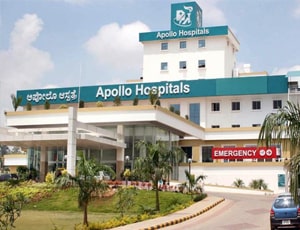
Types of Colorectal Cancer ( Colon Cancer ) Treatment in Apollo Hospitals Bannerghatta and its associated cost
| Treatment Option | Approximate Cost Range (USD) | Approximate Cost Range (INR) |
|---|---|---|
| Colorectal Cancer Treatment (Overall) | 9159 - 17158 | 752144 - 1363432 |
| Surgery | 5004 - 9090 | 415015 - 728339 |
| Chemotherapy | 904 - 2247 | 72587 - 183729 |
| Radiation Therapy | 1141 - 2754 | 93795 - 232020 |
| Targeted Therapy | 1699 - 3367 | 141287 - 272968 |
| Immunotherapy | 2289 - 4597 | 180910 - 364685 |
| Hormone Therapy | 1110 - 2852 | 93319 - 226667 |
| Colostomy | 1724 - 3931 | 138470 - 324954 |
| Ileostomy | 2299 - 4595 | 185709 - 370821 |
| Proctectomy | 2804 - 5574 | 225846 - 468641 |
| Lymph Node Removal | 908 - 2223 | 74061 - 185194 |
| Laparoscopic Surgery | 2253 - 5017 | 183765 - 417400 |
| Robotic Surgery | 2828 - 6174 | 226584 - 510321 |
| Minimally Invasive Surgery | 2821 - 6103 | 229161 - 509810 |
DOCTORS IN 13 SPECIALITIES
FACILITIES & AMENITIES
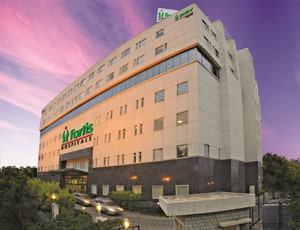
Types of Colorectal Cancer ( Colon Cancer ) Treatment in Fortis Hospital and its associated cost
| Treatment Option | Approximate Cost Range (USD) | Approximate Cost Range (INR) |
|---|---|---|
| Colorectal Cancer Treatment (Overall) | 8104 - 15256 | 666356 - 1245891 |
| Surgery | 4575 - 8101 | 374400 - 668363 |
| Chemotherapy | 809 - 2033 | 66427 - 165757 |
| Radiation Therapy | 1020 - 2545 | 83153 - 207195 |
| Targeted Therapy | 1522 - 3046 | 125145 - 249213 |
| Immunotherapy | 2026 - 4077 | 166623 - 332607 |
| Hormone Therapy | 1015 - 2525 | 83077 - 208280 |
| Colostomy | 1522 - 3567 | 124680 - 290188 |
| Ileostomy | 2026 - 4051 | 165658 - 333611 |
| Proctectomy | 2533 - 5096 | 207399 - 416679 |
| Lymph Node Removal | 811 - 2039 | 66383 - 166040 |
| Laparoscopic Surgery | 2022 - 4554 | 166150 - 375823 |
| Robotic Surgery | 2541 - 5586 | 208930 - 458284 |
| Minimally Invasive Surgery | 2541 - 5573 | 207166 - 458949 |
DOCTORS IN 12 SPECIALITIES
FACILITIES & AMENITIES

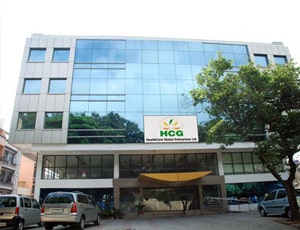
Types of Colorectal Cancer ( Colon Cancer ) Treatment in HCG Kalinga Rao Road and its associated cost
| Treatment Option | Approximate Cost Range (USD) | Approximate Cost Range (INR) |
|---|---|---|
| Colorectal Cancer Treatment (Overall) | 8083 - 15205 | 664266 - 1250236 |
| Surgery | 4581 - 8130 | 373619 - 667521 |
| Chemotherapy | 815 - 2035 | 66340 - 165871 |
| Radiation Therapy | 1011 - 2537 | 83322 - 208499 |
| Targeted Therapy | 1524 - 3039 | 125408 - 250068 |
| Immunotherapy | 2039 - 4042 | 166295 - 333316 |
| Hormone Therapy | 1012 - 2545 | 82844 - 207496 |
| Colostomy | 1518 - 3548 | 124625 - 292450 |
| Ileostomy | 2029 - 4073 | 166481 - 332719 |
| Proctectomy | 2544 - 5097 | 208830 - 415487 |
| Lymph Node Removal | 815 - 2026 | 66789 - 165651 |
| Laparoscopic Surgery | 2020 - 4589 | 166728 - 376301 |
| Robotic Surgery | 2529 - 5594 | 207223 - 459936 |
| Minimally Invasive Surgery | 2543 - 5573 | 207131 - 456699 |
DOCTORS IN 3 SPECIALITIES
FACILITIES & AMENITIES
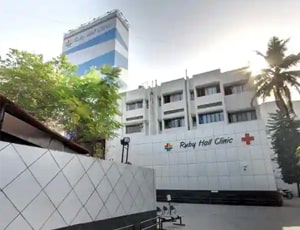
Types of Colorectal Cancer ( Colon Cancer ) Treatment in Ruby Hall Clinic and its associated cost
| Treatment Option | Approximate Cost Range (USD) | Approximate Cost Range (INR) |
|---|---|---|
| Colorectal Cancer Treatment (Overall) | 7452 - 13988 | 608394 - 1158728 |
| Surgery | 4249 - 7548 | 341182 - 617138 |
| Chemotherapy | 738 - 1888 | 61240 - 152497 |
| Radiation Therapy | 942 - 2351 | 76015 - 191452 |
| Targeted Therapy | 1382 - 2848 | 113674 - 232574 |
| Immunotherapy | 1854 - 3794 | 151760 - 307186 |
| Hormone Therapy | 925 - 2304 | 76672 - 190123 |
| Colostomy | 1389 - 3247 | 116658 - 265122 |
| Ileostomy | 1849 - 3771 | 153193 - 308651 |
| Proctectomy | 2373 - 4687 | 192466 - 385207 |
| Lymph Node Removal | 755 - 1898 | 61626 - 154488 |
| Laparoscopic Surgery | 1892 - 4218 | 154102 - 340287 |
| Robotic Surgery | 2362 - 5115 | 193625 - 416986 |
| Minimally Invasive Surgery | 2344 - 5174 | 189236 - 415065 |
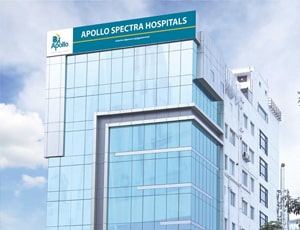
Types of Colorectal Cancer ( Colon Cancer ) Treatment in Apollo Spectra Hospitals and its associated cost
| Treatment Option | Approximate Cost Range (USD) | Approximate Cost Range (INR) |
|---|---|---|
| Colorectal Cancer Treatment (Overall) | 8107 - 15270 | 665004 - 1245940 |
| Surgery | 4583 - 8081 | 374667 - 664300 |
| Chemotherapy | 815 - 2026 | 66476 - 166891 |
| Radiation Therapy | 1017 - 2526 | 83605 - 208233 |
| Targeted Therapy | 1517 - 3050 | 124635 - 250083 |
| Immunotherapy | 2020 - 4076 | 166456 - 332419 |
| Hormone Therapy | 1017 - 2540 | 82921 - 209014 |
| Colostomy | 1523 - 3568 | 125086 - 292120 |
| Ileostomy | 2030 - 4054 | 165914 - 333240 |
| Proctectomy | 2538 - 5051 | 208832 - 417436 |
| Lymph Node Removal | 809 - 2026 | 66756 - 165755 |
| Laparoscopic Surgery | 2039 - 4570 | 166502 - 373997 |
| Robotic Surgery | 2543 - 5591 | 207716 - 459233 |
| Minimally Invasive Surgery | 2545 - 5561 | 207808 - 459982 |
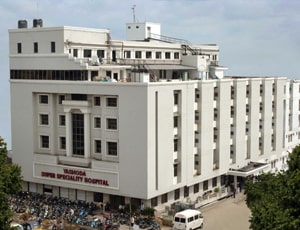
Types of Colorectal Cancer ( Colon Cancer ) Treatment in Yashoda Hospital, Malakpet and its associated cost
| Treatment Option | Approximate Cost Range (USD) | Approximate Cost Range (INR) |
|---|---|---|
| Colorectal Cancer Treatment (Overall) | 8157 - 15220 | 664253 - 1246056 |
| Surgery | 4560 - 8153 | 374361 - 668614 |
| Chemotherapy | 810 - 2037 | 66424 - 166936 |
| Radiation Therapy | 1013 - 2540 | 82823 - 209043 |
| Targeted Therapy | 1518 - 3049 | 124906 - 249565 |
| Immunotherapy | 2020 - 4076 | 166509 - 332921 |
| Hormone Therapy | 1013 - 2535 | 82937 - 208667 |
| Colostomy | 1524 - 3547 | 124856 - 291952 |
| Ileostomy | 2030 - 4071 | 166020 - 333798 |
| Proctectomy | 2542 - 5082 | 207531 - 417039 |
| Lymph Node Removal | 815 - 2039 | 66590 - 167020 |
| Laparoscopic Surgery | 2027 - 4545 | 165657 - 374392 |
| Robotic Surgery | 2543 - 5609 | 207075 - 459233 |
| Minimally Invasive Surgery | 2542 - 5563 | 207696 - 459666 |
DOCTORS IN 10 SPECIALITIES
FACILITIES & AMENITIES
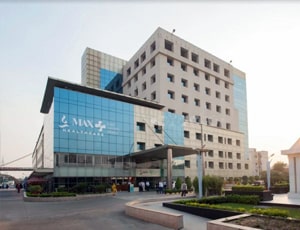
The cost for Colorectal Cancer ( Colon Cancer ) Treatment ranges from USD 7090 - 8070 in Max Super Specialty Hospital, Vaishali
Max Super Specialty Hospital, Vaishali located in Ghaziabad, India is accredited by NABH, NABL. Also listed below are some of the most prominent infrastructural details:
DOCTORS IN 14 SPECIALITIES
FACILITIES & AMENITIES
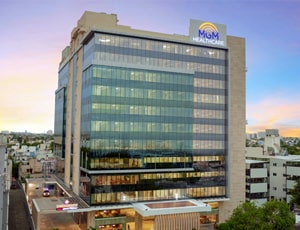
Types of Colorectal Cancer ( Colon Cancer ) Treatment in MGM Healthcare and its associated cost
| Treatment Option | Approximate Cost Range (USD) | Approximate Cost Range (INR) |
|---|---|---|
| Colorectal Cancer Treatment (Overall) | 8135 - 15206 | 668215 - 1244888 |
| Surgery | 4587 - 8118 | 372951 - 668700 |
| Chemotherapy | 810 - 2034 | 66337 - 165735 |
| Radiation Therapy | 1015 - 2547 | 82993 - 208308 |
| Targeted Therapy | 1527 - 3043 | 125206 - 249554 |
| Immunotherapy | 2028 - 4054 | 166830 - 332989 |
| Hormone Therapy | 1019 - 2538 | 83355 - 208842 |
| Colostomy | 1525 - 3562 | 124660 - 291534 |
| Ileostomy | 2035 - 4072 | 166594 - 333136 |
| Proctectomy | 2540 - 5060 | 208021 - 417465 |
| Lymph Node Removal | 814 - 2028 | 66386 - 166832 |
| Laparoscopic Surgery | 2026 - 4548 | 166076 - 376045 |
| Robotic Surgery | 2546 - 5606 | 208362 - 458530 |
| Minimally Invasive Surgery | 2532 - 5568 | 208692 - 457321 |
DOCTORS IN 13 SPECIALITIES
FACILITIES & AMENITIES
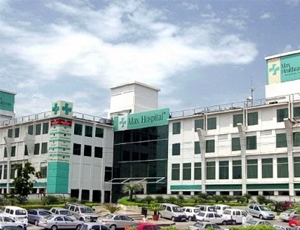
Max Hospital (Gurgaon branch), one of the top medical facilities in India, was established in 2007. Max Gurgaon Hospital is the first multi, super specialty tertiary care in the Location. Out of many other awards, the hospital also possesses the Express Healthcare Awards for Excellence in Healthcare. It is also certified to ISO 9001:2000 standards. The Institute of Minimal Access, Metabolic & Bariatric Surgery at Max Gurgaon has been designated as a Center of Excellence for providing cutting-edge Clinical Services and Surgical Training Programs for Abdominal Wall Hernia Surgery.
Over 5 lakh patients have been treated at the 92-bed Max Hospital Gurugram, which holds expertise in 35 specialized fields such as Cardiac Sciences, Minimal Access, Laparoscopic Surgery, Neurosciences, Urology, Orthopaedics, Aesthetics, Reconstructive Surgery, and Nephrology. The laboratories at Max Healthcare hospitals are accredited by NABH and NABL. It also provides hemodialysis for patients who have end-stage kidney disease and requires renal replacement therapy. Team of doctors and nurses at the hospital provides integrated medical care in a multi-disciplinary setting. As a result, it has received multiple awards and accreditations.
International patients have been treated impeccably here as all the nursing staff, shift doctors, and treating doctors are quite courteous and supportive towards the patients. There is no doubt that being in the hospital can make you feel at home.
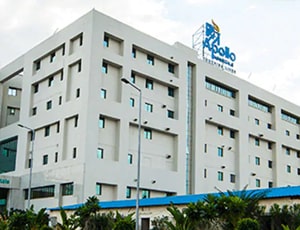
Types of Colorectal Cancer ( Colon Cancer ) Treatment in Apollo Hospital and its associated cost
| Treatment Option | Approximate Cost Range (USD) | Approximate Cost Range (INR) |
|---|---|---|
| Colorectal Cancer Treatment (Overall) | 8905 - 16529 | 732077 - 1384596 |
| Surgery | 4970 - 8806 | 412276 - 751363 |
| Chemotherapy | 915 - 2285 | 73471 - 180845 |
| Radiation Therapy | 1106 - 2838 | 92723 - 228014 |
| Targeted Therapy | 1707 - 3429 | 141057 - 271331 |
| Immunotherapy | 2211 - 4544 | 186119 - 368993 |
| Hormone Therapy | 1149 - 2822 | 93883 - 228799 |
| Colostomy | 1685 - 3982 | 140200 - 318902 |
| Ileostomy | 2300 - 4487 | 183119 - 375730 |
| Proctectomy | 2770 - 5555 | 232544 - 456239 |
| Lymph Node Removal | 910 - 2222 | 74301 - 183332 |
| Laparoscopic Surgery | 2283 - 5003 | 186433 - 417551 |
| Robotic Surgery | 2775 - 6056 | 227412 - 506681 |
| Minimally Invasive Surgery | 2797 - 6195 | 231846 - 512877 |
DOCTORS IN 13 SPECIALITIES
FACILITIES & AMENITIES
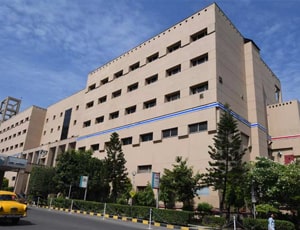
Types of Colorectal Cancer ( Colon Cancer ) Treatment in Apollo Multispecialty Hospitals and its associated cost
| Treatment Option | Approximate Cost Range (USD) | Approximate Cost Range (INR) |
|---|---|---|
| Colorectal Cancer Treatment (Overall) | 8874 - 17024 | 748129 - 1356529 |
| Surgery | 5004 - 8814 | 421454 - 748761 |
| Chemotherapy | 920 - 2242 | 74514 - 188409 |
| Radiation Therapy | 1125 - 2822 | 93337 - 229754 |
| Targeted Therapy | 1657 - 3411 | 139597 - 275688 |
| Immunotherapy | 2246 - 4592 | 188534 - 375033 |
| Hormone Therapy | 1101 - 2853 | 90520 - 226634 |
| Colostomy | 1709 - 3879 | 136044 - 325241 |
| Ileostomy | 2297 - 4500 | 186726 - 371411 |
| Proctectomy | 2766 - 5537 | 232714 - 457185 |
| Lymph Node Removal | 893 - 2234 | 73379 - 186680 |
| Laparoscopic Surgery | 2278 - 5045 | 183529 - 419825 |
| Robotic Surgery | 2751 - 6088 | 235405 - 498587 |
| Minimally Invasive Surgery | 2759 - 6156 | 227422 - 505262 |
DOCTORS IN 13 SPECIALITIES
FACILITIES & AMENITIES
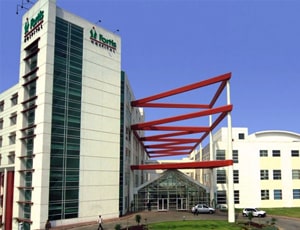
Types of Colorectal Cancer ( Colon Cancer ) Treatment in Fortis Hospital and its associated cost
| Treatment Option | Approximate Cost Range (USD) | Approximate Cost Range (INR) |
|---|---|---|
| Colorectal Cancer Treatment (Overall) | 8144 - 15259 | 667419 - 1247980 |
| Surgery | 4558 - 8151 | 374946 - 665706 |
| Chemotherapy | 814 - 2036 | 66672 - 165954 |
| Radiation Therapy | 1018 - 2527 | 82937 - 207097 |
| Targeted Therapy | 1521 - 3050 | 125282 - 249863 |
| Immunotherapy | 2026 - 4052 | 167162 - 333773 |
| Hormone Therapy | 1017 - 2538 | 83053 - 208719 |
| Colostomy | 1528 - 3552 | 124509 - 291004 |
| Ileostomy | 2030 - 4045 | 165951 - 331962 |
| Proctectomy | 2539 - 5084 | 209009 - 416084 |
| Lymph Node Removal | 811 - 2022 | 66876 - 165901 |
| Laparoscopic Surgery | 2038 - 4555 | 167104 - 374741 |
| Robotic Surgery | 2541 - 5558 | 207458 - 455885 |
| Minimally Invasive Surgery | 2534 - 5604 | 209046 - 459552 |
DOCTORS IN 12 SPECIALITIES
FACILITIES & AMENITIES
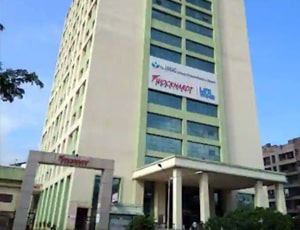
Types of Colorectal Cancer ( Colon Cancer ) Treatment in Wockhardt Hospital, Umrao and its associated cost
| Treatment Option | Approximate Cost Range (USD) | Approximate Cost Range (INR) |
|---|---|---|
| Colorectal Cancer Treatment (Overall) | 8116 - 15187 | 664798 - 1247580 |
| Surgery | 4563 - 8159 | 373469 - 665882 |
| Chemotherapy | 809 - 2025 | 66625 - 166595 |
| Radiation Therapy | 1018 - 2541 | 82926 - 208454 |
| Targeted Therapy | 1525 - 3049 | 125256 - 250330 |
| Immunotherapy | 2028 - 4044 | 165870 - 331505 |
| Hormone Therapy | 1014 - 2533 | 82836 - 207120 |
| Colostomy | 1529 - 3561 | 125376 - 291649 |
| Ileostomy | 2029 - 4048 | 166952 - 332229 |
| Proctectomy | 2542 - 5091 | 207320 - 414444 |
| Lymph Node Removal | 814 - 2022 | 66453 - 167022 |
| Laparoscopic Surgery | 2030 - 4552 | 165809 - 373526 |
| Robotic Surgery | 2539 - 5564 | 207801 - 457522 |
| Minimally Invasive Surgery | 2542 - 5593 | 207367 - 458151 |
DOCTORS IN 13 SPECIALITIES
FACILITIES & AMENITIES
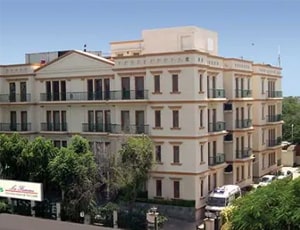
Types of Colorectal Cancer ( Colon Cancer ) Treatment in Fortis La Femme, Greater Kailash II and its associated cost
| Treatment Option | Approximate Cost Range (USD) | Approximate Cost Range (INR) |
|---|---|---|
| Colorectal Cancer Treatment (Overall) | 8099 - 15269 | 663882 - 1243419 |
| Surgery | 4553 - 8114 | 374632 - 663564 |
| Chemotherapy | 815 - 2029 | 66830 - 167278 |
| Radiation Therapy | 1020 - 2526 | 83168 - 208206 |
| Targeted Therapy | 1524 - 3059 | 124904 - 250888 |
| Immunotherapy | 2028 - 4057 | 165819 - 332514 |
| Hormone Therapy | 1019 - 2533 | 82960 - 208963 |
| Colostomy | 1517 - 3540 | 125276 - 289924 |
| Ileostomy | 2025 - 4053 | 165779 - 331790 |
| Proctectomy | 2545 - 5076 | 207374 - 416607 |
| Lymph Node Removal | 814 - 2027 | 66542 - 167186 |
| Laparoscopic Surgery | 2031 - 4554 | 165882 - 375392 |
| Robotic Surgery | 2546 - 5555 | 207583 - 458579 |
| Minimally Invasive Surgery | 2545 - 5607 | 208232 - 457255 |
Colon Cancer is the abnormal growth of the cells in the inner lining of the colon part of the large intestine also known as bowel cancer, colon cancer, or rectal cancer. This abnormal growth is called a polyp.
Colorectal cancer can affect men and women equally. However, studies have proven that men might develop it at a younger age.
There is no definite cause of colorectal cancer, but old age and certain lifestyle factors can increase colorectal cancer risk. Some of these colorectal cancer risk factors include the following:
A majority of colorectal cancers are adenocarcinoma. If you have been diagnosed with colorectal cancer, there are 95 percent chance that it is an adenocarcinoma. But there are some other types of colorectal cancer such as:
The doctor selects the most appropriate course of treatment for the patient after assessing the stage. Every patient has a customized treatment plan that is designed to best address their unique needs. The following options could be part of the treatment strategy.
Different types of surgery options can be used as per the identified stage of colorectal cancer. Surgery can be divided into two major segments: Early-stage colorectal cancer surgery and advanced-stage colorectal cancer surgery.
Early-stage colorectal cancer surgery: This is a minimally invasive form of surgery, which is typically recommended when the cancer is small and has not spread to other parts of the body. Early stage colorectal cancer surgery includes the following procedures:
This is a more invasive surgical option, recommended when cancer has grown into or through your colon. It can be of the following types:
In chemotherapy treatment, an anti-cancer drug is used to destroy the cancerous cells. It is commonly used before surgery, in an attempt to shrink a tumor before its surgical removal. It can also be given to relieve symptoms of colon cancer, in case it has spread to other parts of the body.
A certain number of chemotherapy cycles are also repeated after the surgery to kill the remaining cancer cells. This helps minimize the chances of cancer recurrence.
In this treatment, radiation beams such as X-ray or proton beams are used to kill cancer cells. It also prevents cancer cells from multiplying any further. This treatment is more commonly used for rectal cancer treatment before surgery to shrink the tumor. It can also be used after the surgery. Radiation therapy is the best treatment if cancer has penetrated through the wall of the rectum or traveled to nearby lymph nodes.
Targeted drug therapy is typically used for people with advanced colon cancer. It can be given alone or in combination with chemotherapy. Specific drugs help cancer cells commit suicide and strengthen the immune system. However, this treatment comes with limited benefits and risk of side effects.
Patients undergoing the surgery are required to stay in the hospital for at least two to three days after the surgery. You may expect yourself to be discharged from the hospital after regaining bowel function and the ability to eat without the support of an IV. Pain is controlled with the help of medications and it may take another two to three weeks at home before you can switch back to your normal routine.
If the Patient had surgery for the removal of bowel cancer, it may take a few weeks before you can return to work. In the case of laparoscopic surgery, you can return to work in about two weeks. In the case of open surgery, it may take around four to six weeks for you to return to work.
Patients must pay particular attention to eating the right food and avoid dehydration after bowel cancer surgery. Include high-protein foods in your diet and choose low-fiber foods if you have diarrhea. Additionally, eat limited amounts of green vegetables and only eat peeled fruits.
Patients who undergo chemotherapy before or after the surgery may experience a few side effects such as nausea, vomiting, fatigue, and pint pain. Make sure to drink plenty of fluids to minimize the side effects and recover quickly. Take emergency medications prescribed by the doctor, if needed.
Ask your healthcare adviser for the best multiple options and choose the one that meets your expectations
The cost of colon cancer treatment in India starts from USD$ 8000 and is conducted across many multispecialty hospitals.
Colorectal Cancer treatment package cost in India has different inclusions and exclusions. Typically, this package covers all expenses related to the patient's pre and post-surgery care, encompassing the fees of the surgeon, hospitalization, and anesthesia. However, costs may escalate if there are complications post-operatively, or if a new medical condition is diagnosed outside the package duration.
There are about 61 top hospitals for colorectal cancer treatment in India, with some of the most renowned ones listed below:
After discharge from the hospital, the patient has to stay for another 30 days in the country for complete recovery. During this time, the patient undergoes medical tests and consultations. this is to ensure that the treatment was successful and the patient us safe to return.
Besides India, several other countries are popular choices for colon cancer surgery, as listed below
Apart from the colorectal cancer treatment cost, the patient may have to pay for additional daily expenses such as for a guest house after discharge and meals. The per day extra expenses in India per person is about USD 25.
After the Colorectal Cancer Treatment takes place, the average duration of stay at the hospital is about 4 days. During the recovery, the patient is carefully monitored and control tests are performed to see that everything is okay. If required, physiotherapy sessions are also planned during recovery in hospital.
The overall rating for hospitals providing Colorectal Cancer ( Colon Cancer ) Treatment in India is 4.6. Several parameters such as hospital infrastructure, pricing policy, quality of services, politeness of staff etc. contribute to the rating.
Gradually, India is getting its due recognition in the field of medicine and especially for Colon Cancer Treatment. In India, the most-recognized hospitals ‘medical facilities provided to the patients are remarkable just like India’s counterparts such as the United States of America, Singapore, etc. The Indian hospitals’ prominence goes a notch higher due to the affordable treatment costs of Colon Cancer.
The outstanding hospitals situated in India for Colon Cancer Treatment are well-equipped with state-of-the-art healthcare facilities. These hospitals make use of highly advanced MRI and CT technology and other modern diagnostic and imaging amenities. Keeping the international standard in mind, these topmost Indian hospitals make certain to provide the patients with all kinds of medical services possible.
Coming to the Colon Cancer surgeons, they are internationally-trained, highly-experienced, have years of expertise in their field and are associated with many top-rated hospitals of India known for providing the best Colon Cancer Treatment. All in all, undergoing Colon Cancer Treatment in India will allow you to experience the best healthcare services and that too, at extremely affordable rates.
The average cost of Colon Cancer Treatment in India is $2,700 to $4,600. However, one crucial thing to keep in mind regarding the treatment’s cost is that it hugely depends on several factors such as –
Patient’s medical condition
Type of surgery
Hospital brand
Type of room
Expertise of the surgeon
The top Oncologists and Colon Cancer Doctors in India are –
1. Surgery: In this, the tumor is removed along with healthy tissues in the proximity of the cells. It is one of the most common treatment plans for colon cancer. Portions of the rectum or colon and some surrounding lymph nodes will be removed.
2. Radiation therapy: It is given after or before surgery and commonly with chemotherapy (chemoradiation). It is given for a minimum of 5 days a week over a period of a few weeks, but the length of the treatment depends upon the stage and type of tumor. It can sometimes relieve symptoms like pain, problems in eating or bleeding.
3. Chemotherapy: The drugs and medicines in this therapy are given to the patient intravenously or through the mouth. These travel through the bloodstream to tumor areas and destroy the cancer cells.
4. Targeted Drug Therapy: Sometimes the standard chemotherapy treatment does not work. Cancer cells have particular mutations leading to overaccumulation of these. The mutations can be targeted with specific drugs that stop their growth. The side effects are variable from that of chemotherapy.
5. Immunotherapy: This therapy stimulates a person’s immune system to look for cancer cells and kill them effectively. There are various checkpoint proteins present in the immune cells that behave like switches that are switched off or on for an immune response (for beginning or ending it). An important property of the immune system is not to kill its own cells, but rather foreign cells and tumors. Cancer cells might use these checkpoints to hide from the immune cells. Immunotherapy uses drugs that target these checkpoints.
The size and extent of the tumor are measured by the TNM system:
Tumor (T): It describes the size of the tumor that has formed
Node (N): It describes if the tumor has spread to the nearby lymph nodes
Metastasis (M): it describes if cancer has spread to distant organs
Recurrence: A state of remission is when cancer is no longer detected in the body and there are no symptoms present. This can also be called NED or no evidence of disease. It can be permanent or temporary.
NOTE: After all the diagnostic tests have been done, the doctor will confirm if the cancer is present or not. If present, the staging (description) of the cancer is done
| Stages of Colon Cancer | Success Rate |
|---|---|
| Stage I | 95% |
| Stage II | 75% |
| Stage III | 60% |
| Stage IV | 40% |
If colon cancer is found early, it has a higher survival rate than cancer detected in the later stages. In the early detection, colorectal cancer has lesser complications and hence, the survival rate is high. It is more occurrent in people above the age of 50, there is hardly any risk of colorectal cancer below the age of 50.
NOTE: The success of the treatment depends upon the age of the patient, treatment options, place of the tumor, overall health, equipment use, etc.
If a person has been diagnosed with colorectal cancer, the doctor may suggest surgery which generally offers the best chance of treatment. However, chemotherapy and radiation therapy can be used before or after surgery to shrink the tumor for easier retrieval and/or destroy the remaining cells.